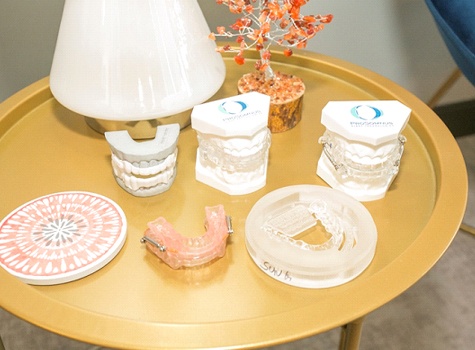Obstructive Sleep Apnea – Dallas, TX
What You Need to Know About Obstructive Sleep Apnea
Obstructive sleep apnea (OSA) is a sleep-breathing disorder characterized by breathing pauses that occur multiple times per hour during the night and are caused by a blocked or partially blocked airway. It is believed there is an estimated 22 million Americans suffer from the condition, with 80 percent of suspected cases remaining undiagnosed. Dr. Smith and our team at Star Sleep & Wellness want to offer safe and effective solutions to improve patients’ lives. By treating OSA in its earliest stages, we can help individuals embrace a better quality of life. Contact us to schedule an appointment and learn more.
What Causes Obstructive Sleep Apnea?

The most common cause of obstructive sleep apnea is a blocked or partially blocked airway. When the throat muscles begin to relax while sleeping, they collapse and create an obstruction. As a result, it prevents adequate airflow. After 10 seconds of ceased breathing, the oxygen within the body begins to lower, causing the brain to be triggered so that it will alert the body to wake.
This process can be subtle or significant depending on how long a person goes without breathing. Many patients experience one or even hundreds of episodes each night.
Possible Complications of OSA

Untreated sleep apnea can have debilitating effects on a person’s ability to function day to day. Some of the most obvious and serious complications that can occur include:
- An increased risk of drowsy driving
- Workplace incidents
- Stroke or heart attack
- High blood pressure
- Diabetes
- Heart disease
- Chronic fatigue
- Moodiness and irritability
- Weight gain that leads to obesity
- Bedwetting
- Loss of libido
- Regular headaches
When Should I See A Doctor?

Knowing when you should see a doctor may not always be obvious, especially if you do not live with someone who can tell you if you snore or stop breathing throughout the night. However, if you or someone you love notices any of these issues, call Dr. Smith and our team at Star Sleep & Wellness right away. We will schedule an appointment so that you can undergo a consultation, and we can determine the appropriate course of action.
Call us if you:
- Wake others because of your loud snoring
- Wake gasping or choking because of your ceased breathing
- Learn that you experience pauses in your breathing while asleep
- Experience chronic fatigue throughout the day, which is impacting your work or ability to drive
Types of Treatment for Obstructive Sleep Apnea

While suffering from obstructive sleep apnea might seem hopeless, the good news is there are many types of treatment available to improve your situation.
Oral Appliance Therapy
A popular option among sleep apnea sufferers is oral appliance therapy. Because of its portability, comfort, and convenience, it is easy to use, and individuals can experience great results. Customized according to each person’s oral and facial structures, they help to shift the jaw to prevent the collapse of the soft tissues, keeping the airway open at night.
Learn More about Oral Appliance Therapy
Continuous Positive Airway Pressure (CPAP)
The continuous positive airway pressure system (CPAP) is one of the most widely-known and accepted forms of sleep apnea treatment. Requiring a mask, tubing, and a machine, the device is worn to bed and continually pushes air through the mask to keep the airway open.
Combination Therapy
Combination therapy incorporates both CPAP and oral appliance treatment. This method is known to reduce the number of times a person wakes throughout the night as a result of ceased breathing. Because the CPAP’s pressure is not on the highest setting (because of the oral appliance’s ability to keep the area open), it minimizes the likelihood that patients will be bothered much by the noise of the machine. Also, should an individual need to travel, they can still achieve restful sleep by taking their more portable oral appliance with them.
Surgery
One of the least common methods of treatment for OSA is surgery. In most cases, patients can achieve long-lasting results using any of the above-mentioned solutions; however, if enlarged tonsils, adenoids, or other soft tissues are preventing adequate airflow, it may be necessary to undergo a surgical procedure to help alleviate symptoms.
